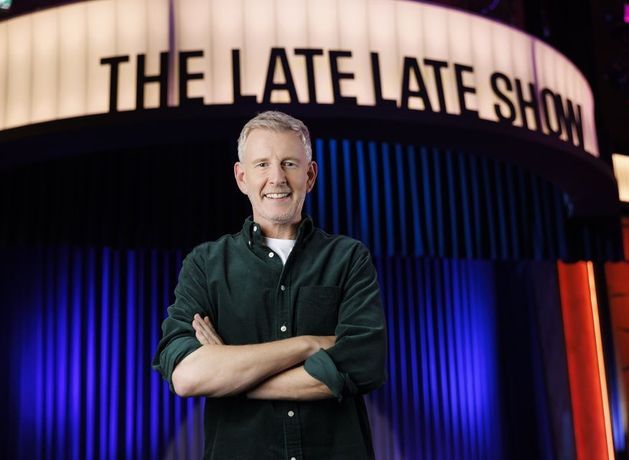'I died on my ass' — Patrick Kielty describes his first 'Late Late Show ...

The comedian looks back at the highs and lows of 1994 as an important year of change on the whole island of Ireland
Patrick Kielty has recalled how his black comedy on the topic of the Troubles failed to raise laughs on his first ever appearance on The Late Late Show with Gay Byrne.
In a new BBC Radio Four documentary, he refers to it as a lightbulb moment because the edgy material — which involved props like a balaclava, a bag of fake Semtex and a fake gun — had been a hit for him north of the Border.
“I died on my ass,” he says, referring to his stand-up routine as a 21-year-old on The Late Late Show as part of a national comedy competition. “That was the first time I realised there was a disconnect and the difference between the lives that people in the south were living and people in the North were living.”
He says there was “very little whimsy” in his routine.
“The early 1990s in Northern Ireland were grim, and while a new generation of comedians like me were trying to make sense of the conflict by finding the absurdity in it all, it affected us, whether we thought it did or not,” he says.
Growing up in Dundrum, Co Down, he considers himself to have grown up in an “Irish household.”
“We played Gaelic football. Gaelic football is a 32-county all-Ireland organisation. So in your head you felt that you were part of Ireland. And why wouldn’t you be part of Ireland?
“And then to go to the capital of Ireland and to do material which seemed to be working on one part of the island and for that audience to go, ‘what is going on here?’. I would say they were trying to get out of the studio, it wasn’t pretty,” he jokes in the programme.
He recalls that back then, the type of TV aerials on houses in the North was a good indicator as to whether a household was Catholic or Protestant. There tended to be two on Catholic houses.
“I think my Dad had potentially the biggest aerial that there actually was to get the signal over the top of the Mourne mountains where we lived.”
On Friday nights they would tune into the show he now hosts. “You had to flick a little switch to (flip) over on to the other aerial to watch Gay Byrne.”
There were so many other people who were living with a similar trauma
Kielty was just 16 when his dad, Jack, was assassinated by loyalist paramilitaries after he refused to pay protection money in 1988. A few years later, he was on the stand-up circuit in Belfast hitting a chord with audiences by finding grim humour around the Troubles. Looking back, he describes a collective survival mode in the North at the time with so many lives shattered by the conflict.
“With the passing of time, you realise that you were living through trauma, and you were living with trauma, and there were so many other people who were living with a similar trauma.
“I think the trauma, and the human brain, does a brilliant thing. In order to survive and in order to move forward and in order to keep going, all of the stuff that you can look at now and say ‘that was terrible’, you actually paper over the cracks and move on — and thank God you were able to put one foot in front of another.”
In the series, focusing on 1994, he delves into the hope and optimism starting to bubble up on both sides of the Border around that time with the excitement around the national soccer team and emerging musical superstars. “I don’t think you can underestimate the importance of U2 in this at that time, because if you look at the early 90s, the biggest rock group in the world were Irish.”
The hour-long show presented with producer Ruth Sanderson, also from Northern Ireland, looks at seismic cultural moments like The Commitments and Riverdance.
The documentary also recalls the rollercoaster of hope and false dawns around the peace process. Kielty remembers throwing out his prepared script when he went live on-air on his BBC chat show PK Tonight, just hours after the horror of the Canary Wharf bombing.
That was the moment when all of these things started to be seen on an all-island basis
He also remembers the excitement of Bill Clinton coming to Belfast to turn on the Christmas lights.
“The notion that a US president is going to show up. There were so many things that happened around that time you were going, What? What? Really?”
From the distance of two generations, he believes the events of 1994 had a transformative effect on Ireland.
“If you look at the island as a whole, that was the moment when all of these things started to be seen on an all-island basis.
“The idea that the movie industry would come and shoot Game of Thrones in Co Down. The idea that Fox Studios are shooting stuff now down in Wicklow.
“The idea that the tourist boards North and south have come together to promote ‘come and see the island’. So much happened around that time which allowed that soft unity to take place and it all goes back to 1994.”
Archive on 4: ‘Hey World, What’s the Craic? Patrick Kielty on Ireland’s 1994’ broadcasts on BBC Radio Four on Saturday, October 12 at 8pm.









































